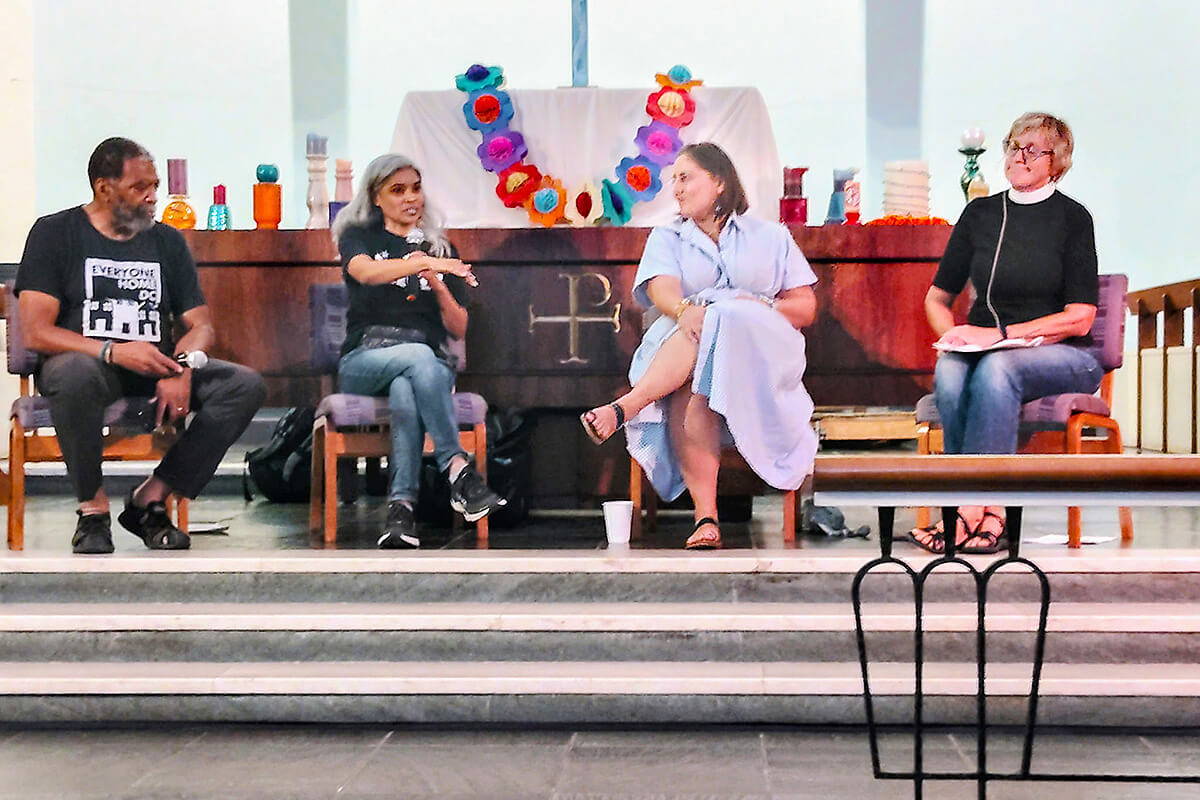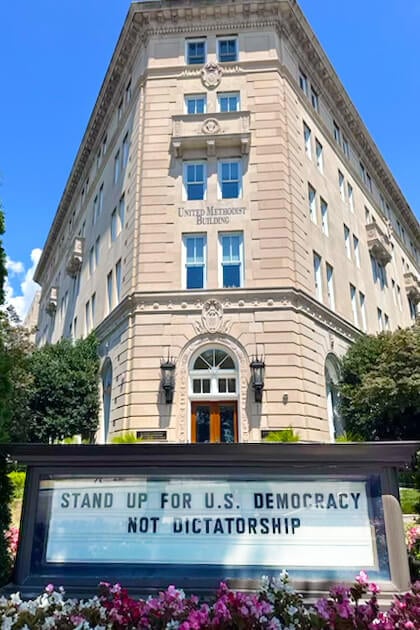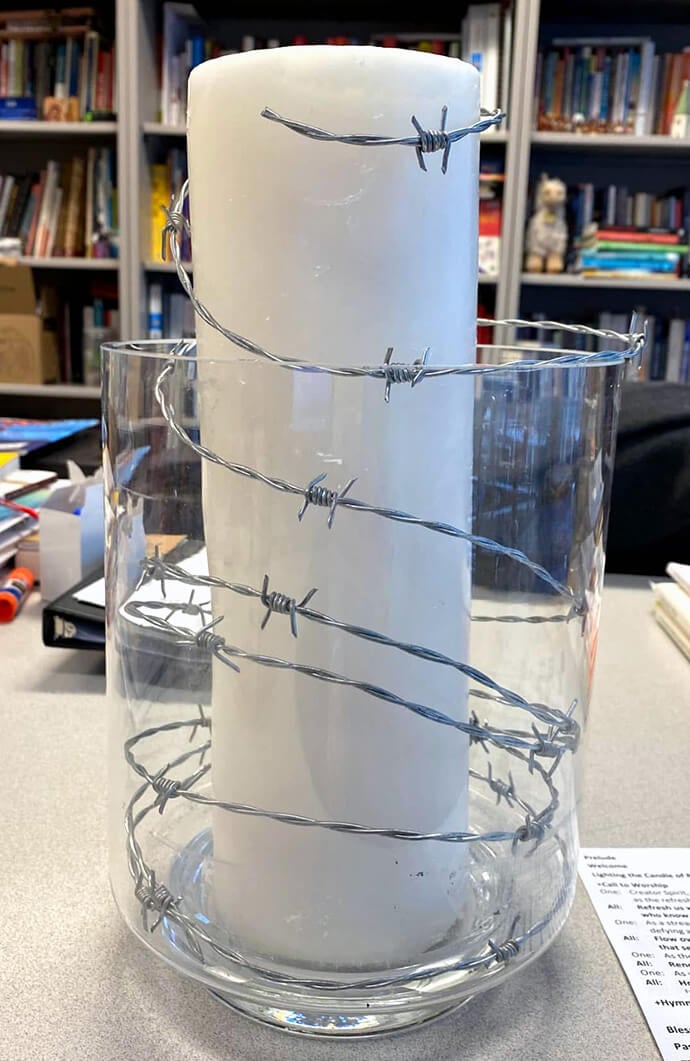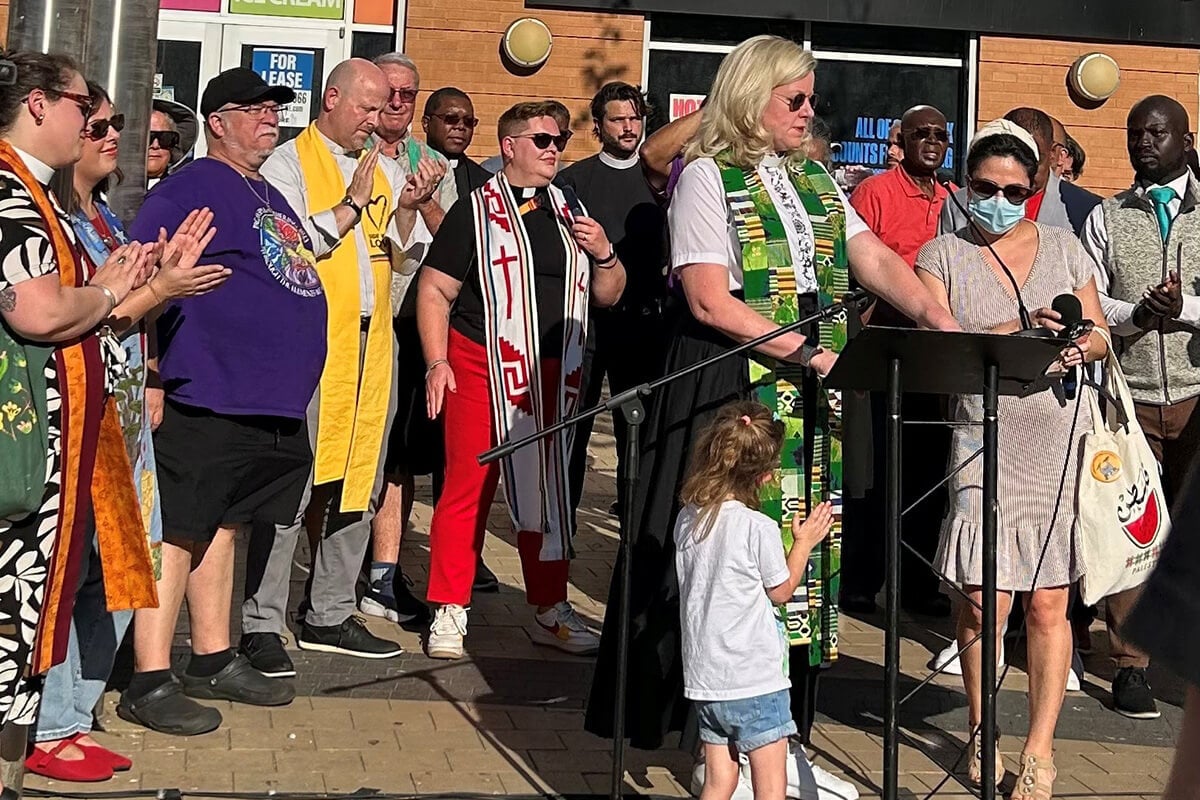Key points:
- Many United Methodists in the D.C. area are stepping in to protect people targeted by President Trump’s show of military force.
- Like fellow church members in Los Angeles, they also are prayerfully helping to mobilize nonviolent resistance and provide pastoral care.
- Now with President Trump threatening to deploy National Guard troops in other cities, they have lessons to share.
As armed military troops and masked federal agents patrolled D.C. neighborhoods, religious leaders joined in a prayer vigil that offered a more hopeful vision for the U.S. capital.
“There is enough — enough time, enough compassion, enough money — if only we would choose to use our resources for healing rather than control, for liberation rather than bondage,” preached the Rev. Donna Claycomb Sokol, pastor of Mount Vernon Place United Methodist Church.
She spoke at the Aug. 22 “Multi-Faith Prayer Vigil for Healing and Justice,” whose sponsors included both Mount Vernon Place and Foundry United Methodist churches. Hundreds of people crammed into the Columbia Heights Civic Plaza to join the prayer gathering led by around 40 faith leaders from across D.C. The show of unity took place in an ethnically diverse northeast D.C. neighborhood that recently has seen immigrant residents seized by masked federal agents.
The evening vigil was just one way that United Methodists and other people of faith are seeking to bolster community solidarity, defend the vulnerable and fight back against intimidation in the two weeks since President Trump’s militarization of the nation’s capital.
On Aug. 11, Trump took the unprecedented step of invoking the president’s statutory authority to override D.C. control of the police and deploy National Guard troops into the city streets. Trump promised the move would combat crime, despite the fact that the U.S. Justice Department reports violent crime in D.C. is at a 30-year low — lower than during Trump’s first term — and the National Guard is not trained for police work.
“There is a more excellent way,” wrote Bishop LaTrelle Miller Easterling, quoting 1 Corinthians 12:31, in response to Trump’s announcement. The bishop, who leads both the Baltimore-Washington and Peninsula-Delaware conferences, noted that the United Methodist churches in her area already are working to house the homeless, mentor young people and support the kind of social services that reduce crime.
United Methodists in the Los Angeles area know well what D.C. is experiencing. Since June, they also have been nonviolently protesting a military presence in their downtown as well as an immigration crackdown. While Trump’s initial deployment of 5,000 National Guard members and U.S. Marines has dropped considerably, the National Guard still has a presence around the Los Angeles federal building.
“Even now, as we are months into this new normal, we are still learning,” said Monalisa Tui’tahi, an immigration attorney and leader in the California-Pacific Conference. The two lessons she wishes to impart from the Los Angeles experience are the importance of churches building relationships and showing up.
“Being present is a statement, a counternarrative to the narrative of hate and injustice that rule the day,” she said.
With Trump now threatening to send troops into more U.S. cities including Chicago and Baltimore, United Methodist leaders are working nationwide to mobilize nonviolent, compassionate responses to what many see as rising authoritarianism.
“This is our season for agitation, sustained resistance and disciplined hope,” wrote Bishop Julius C. Trimble, the top executive of the United Methodist Board of Church and Society, in his monthly column.
As head of the denomination’s social-witness agency, Trimble is in the thick of things. The United Methodist Building, which Church and Society oversees, is the only non-governmental building on Capitol Hill.
“The Love Ethic that is so central to the teachings of Jesus and marching orders for the church cannot be free of radical resistance to the oppression of peoples,” Trimble wrote.

Shining a light in dark times
Claycomb Sokol and other United Methodists in the D.C. area are already trying to put that love ethic into action.
“It is this careful balance between the pastoral and the prophetic,” Claycomb Sokol told United Methodist News.
For now, that means she is trying to tend to congregants’ fears while also helping them to think theologically — as followers of Jesus — about what’s happening in their city.
The federal surge intended to fight crime has become mainly an immigration dragnet, even though simply being in the U.S. without legal documentation is not a crime but a civil offense. Under pressure from a federal judge, the Trump administration pulled back its effort to completely take over D.C. police, but instead secured the city’s cooperation in federal immigration enforcement.
Bishops’ book aims to address current moment

For more than a year, the United Methodist Council of Bishops has been working to produce a study on authoritarianism. The book, “The Courage to Love,” is set to be released Oct. 21.
Bishop Kennetha Bigham-Tsai, chair of the bishops’ task force working on the book, stressed authoritarianism is a worldwide problem and not just a current issue in the U.S.
“My prayer is that this resource will help United Methodists worldwide understand authoritarianism and the threat it represents to the Gospel ideals by which we try to live,” said Bigham-Tsai, who leads the Iowa Conference and co-leads the Illinois Great Rivers Conference.
“Ultimately, I pray that this resource will inspire United Methodists everywhere to stay true to Christ’s call to love and build the beloved community. No matter what is going on around us, love is always our answer. In this current moment, it will take courage to love.”
The bishops plan to provide information on how to preorder the book, which will be published by the United Methodist Publishing House, as soon as it’s available.
Now, troops — in armored vehicles or on foot — patrol federal landmarks and other high-traffic tourist spots. Meanwhile, federal agents have set up checkpoints at various intersections around the nation’s capital to review people’s identification papers. Abandoned scooters now dot neighborhoods where agents have seized food-delivery men going about their work, the city’s restaurants report a slump in customers and many immigrants are fearful to leave their homes.
Claycomb Sokol said “a pall of darkness” shrouds the city. Her church and others in the area already were reeling from the mass layoffs of federal workers earlier this year.
Working to supplant despair with discipleship, Claycomb Sokol has revived a ritual used by Central Methodist Mission in Johannesburg during the struggle against apartheid. At each Sunday worship since February, the Mount Vernon Place congregation lights a Candle of Peace, Hope and Justice — a white candle wrapped in barbed wire. Worshippers then pray for people targeted by “barbed-wire policies” and recommit to the United Methodist baptismal vows to “resist evil, injustice and oppression.” The ritual concludes each week with the congregation proclaiming, in the words of John 1:5, “The light shines in the darkness, and the darkness did not overcome it.”
The advocacy group Methodist Federation for Social Action has now spread the ritual across the U.S., with about 60 churches joining in each week.
Claycomb Sokol wants church members to think about what’s at stake. “Evil is anything that is pushing against or contrary to the ways of God,” she said, “and to the promise of Jesus that he has come, that we might have life and have it abundantly.”
Shielding the vulnerable
United Methodists are also merging their prayers with protection for the homeless and immigrants, the people most imperiled by the federal crackdown.
At the multiethnic Capitol Hill United Methodist Church, located a few blocks from the Capitol building, the daily “Food and Friendship” breakfast ministry continues unchanged. But the church’s migrant ministry partners are taking extra precautions — including delivering food so people need not leave their homes. Church members are quietly using text applications to inform neighbors about checkpoints and immigration enforcement around the city, said the church’s senior pastor, the Rev. Stephanie Vader.
On Aug. 24, the church hosted a panel discussion to build community support. The discussion featured leaders of the nonprofits Everyone Home DC, Free DC and Migrant Solidarity Mutual Aid as well as the congregation on how to respond to the situation. The community discussion drew a crowd eager to learn how to help.
“For a lot of folks who are just stepping into this kind of work, the starting point is to get to know your neighbors — just get to know the people who live on your block,” said Ryan Clements, the church’s director of discipleship and service.
He said Keya Chatterjee, executive director of the statehood-advocacy group Free DC, described the situation best. “We let this coup happen by not knowing our neighbors,” she told the crowd. “And we will get out of this by building community.”
Immigration and Customs Enforcement statistics indicate people from Mexico and Central and South America are being especially targeted, said the Rev. Lydia E. Muñoz. She leads El Plan for Hispanic/Latine Ministry, which supports Hispanic United Methodist church development. Most being detained have no criminal history.
“At this moment, congregations across the country are watching the events unfold in D.C. and the question in everyone’s mind is, ‘When are they coming for us next? Are we the next target?’” she said. “Which means that Hispanic/Latine clergy and congregations are having to make decisions about everything they do.”

Speaking the truth
Standing up for what’s right starts with telling the truth and taking special consideration for those at risk.
That is what the Rev. Joseph W. Daniels, lead pastor of Emory Fellowship in D.C., is trying to do. Many members of his largely Black United Methodist congregation, he said, have cut back on unnecessary travel to anywhere but work and home. Their concern is not crime but potential violence from federal authorities.
D.C. residents know that when politicians talk about crime, Daniels said, racist policies can often follow. He also knows the people of D.C., where Blacks are the largest demographic group, have long lacked the same rights as state residents — including a lack of representation in the U.S. Congress. Even now, the U.S. House has punched a hole in the city’s budget by refusing to release $1.1 billion already paid for by District taxpayers.
Subscribe to our
e-newsletter
As a D.C. native, he said he realizes that crime is always a concern. But the District is in much better shape today than during the crack-cocaine epidemic of the 1980s and early 1990s.
“D.C. is a great city,” he said. “It’s a tremendous city, and, by and large, it’s a safe city.”
The Rev. Giovanni Arroyo, who works in D.C. as the top executive of the United Methodist Commission on Religion and Race, sees the city’s militarization as a moment to live out the church’s mission. However, he cautions that authoritarianism often disguises itself in the language of faith.
“My advice to United Methodists is to stay rooted in the liberating message of Jesus Christ, which calls us to set the oppressed free and to resist forces that distort our faith for political power,” he said. “This means speaking with moral courage, challenging racism and xenophobia wherever they appear, and standing in solidarity with communities most impacted.”
Jessie Smith, director of research, planning and spiritual formation at Church and Society, pointed out that the people called Methodist have challenged authoritarianism before.
Methodist Episcopal Bishop Bromley Oxnam, for example, was an outspoken critic of investigations into religious leaders during the McCarthy era. In July 1953, Oxnam testified for over 10 hours defending himself and other religious leaders at the House Un-American Activities Committee. The committee unanimously voted that he did not have any Communist affiliation.
Smith, who previously taught Christian history at United Methodist-related Emory University, sees fellow United Methodists and others leading courageously even now.
“The residents of D.C. are resilient, and we are finding ways of connecting, checking in on one another, reducing harm, actively witnessing to the actions of law enforcement and the military,” she said, “and making sure those most vulnerable are supported as best as they can be during these times.”
With a new school year starting up, Claycomb Sokol is particularly praying for immigrant parents fearful to walk their children to class and the children themselves worried they may be snatched away from their families.
While the Immigration and Customs Enforcement director said agents would not be at D.C. schools on the first day, they might come onto campuses in the future. That possibility haunts Claycomb Sokol and many of her fellow United Methodists.
But she also keeps her faith and hope in God, the Alpha and Omega.
“God is going to get the last word,” she said.
Hahn is assistant news editor for UM News. Contact her at (615) 742-5470 or [email protected]. To read more United Methodist news, subscribe to the free UM News Digest.




